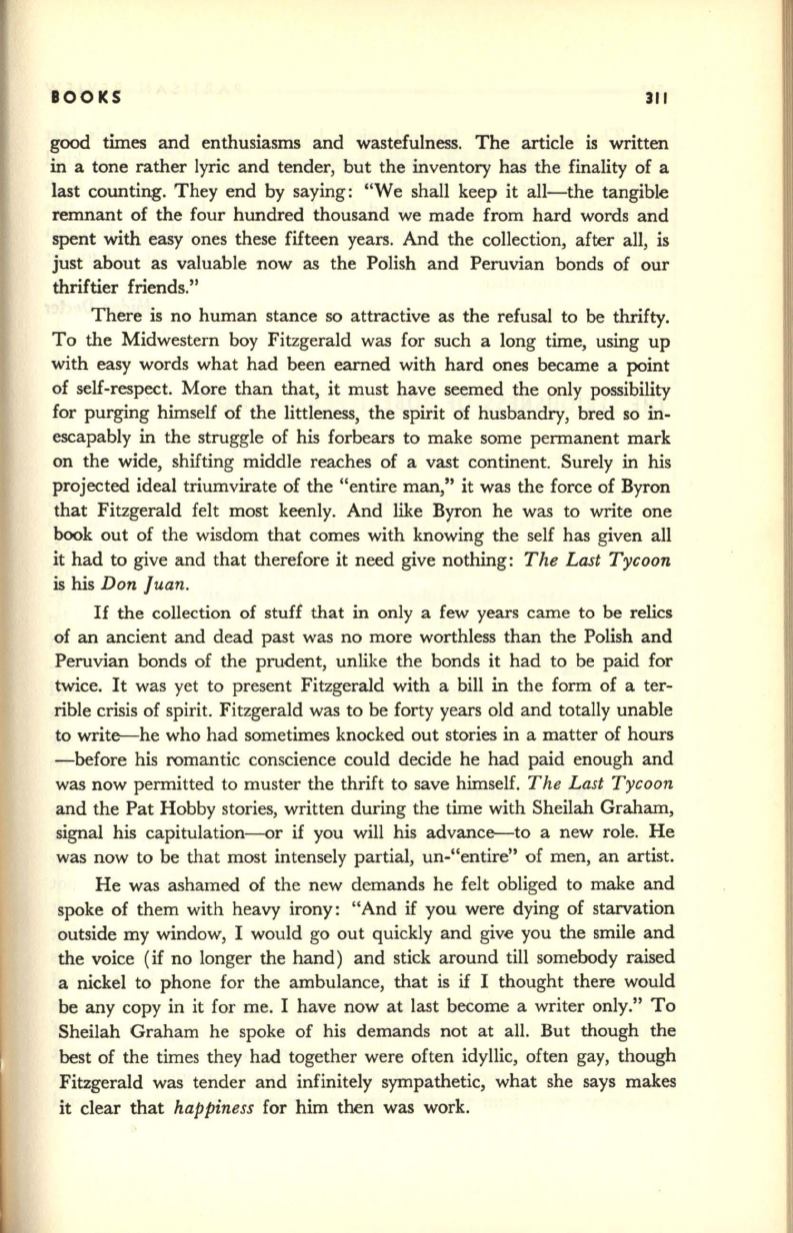
BOOKS
311
good times and enthusiasms and wastefulness. The article is written
in a tone rather lyric and tender, but the inventory has the finality of a
last counting. They end by saying: "We shall keep it all-the tangible
remnant of the four hundred thousand we made from hard words and
spent with easy ones these fifteen years. And the collection, after all, is
just about as valuable now as the Polish and Peruvian bonds of our
thriftier friends."
There is no human stance so attractive as the refusal to be thrifty.
To the Midwestern boy Fitzgerald was for such a long time, using up
with easy words what had been earned with hard ones became a point
of self-respect. More than that, it must have seemed the only possibility
for purging himself of the littleness, the spirit of husbandry, bred so in–
escapably in the struggle of his forbears to make some permanent mark
on the wide, shifting middle reaches of a vast continent. Surely in his
projected ideal triumvirate of the "entire man," it was the force of Byron
that Fitzgerald felt most keenly. And like Byron he was to write one
book out of the wisdom that comes with knowing the self has given all
it
had to give and that therefore it need give nothing:
The Last Tycoon
is his
Don Juan.
If
the collection of stuff that in only a few years came to be relics
of an ancient and dead past was no more worthless than the Polish and
Peruvian bonds of the prudent, unlike the bonds it had to be paid for
twice. It was yet to present Fitzgerald with a bill in the form of a ter–
rible crisis of spirit. Fitzgerald was to be forty years old and totally unable
to write-he who had sometimes knocked out stories in a matter of hours
-before his romantic conscience could decide he had paid enough and
was now permitted to muster the thrift to save himself.
The Last Tycoon
and the Pat Hobby stories, written during the time with Sheilah Graham,
signal his capitulation-or if you will his advance-to a new role. He
was now to be that most intensely partial, un-"entire" of men, an artist.
He was ashamed of the new demands he felt obliged to make and
spoke of them with heavy irony: "And if you were dying of starvation
outside my window, I would go out quickly and give you the smile and
the voice (if no longer the hand) and stick around till somebody raised
a nickel to phone for the ambulance, that is if I thought there would
be any copy in it for me. I have now at last become a writer only." To
Sheilah Graham he spoke of his demands not at all. But though the
best of the times they had together were often idyllic, often gay, though
Fitzgerald was tender and infinitely sympathetic, what she says makes
it clear that
happiness
for him then was work.


